Conversations: B.J. Barham, Part 2
Discussing the music business, songwriting, and Isbell friendship with acclaimed American Aquarium leader
B.J. Barham picks up the phone and apologizes. He needs to delay the start of our conversation.
The 38-year-old American Aquarium frontman, a self-described extravert who talks a mile a minute and is known for his high-energy tightrope walking shows, is picking up his daughter from pre-school.
“Can you call me back in 10 minutes?” Barham says. “I just need to get her home and settled and then we can talk.”
A few minutes later, we’re off and running, talking for more than an hour about the growing popularity of the Raleigh, N.C.-based group, which is touring for a couple of weeks each month during the summer and supporting the Drive-By Truckers on the road this fall. The touring comes on the heels of increased acclaim for Barham’s songwriting and band, which first made noise with the Jason Isbell-produced Burn.Flicker.Die in 2012.
The career-spanning conversation is edited for length and clarity.
Your shows are a combination of family reunion, tent revival, and arena rock concert. I love the commitment you bring to it, whether you’re playing for two people or 2,000.
That's what we're going for. [Laughs] We always have the joke that whether it's 10 or 10,000 people, they get the same show no matter what.
You’ve talked often about the band’s struggles, both before and after Burn.Flicker.Die., which came out in 2012. Why have you persevered in this business when others haven’t?
The music business is hard, but if you're willing to put your head down and do the work, it is conquerable, and by conquerable I don't mean like becoming an arena rock band and making millions of dollars and selling millions of records. I'm talking about being able to carve out your own little piece of this industry and make a good living playing music to for 200 to 300 people every night. That’s totally doable if you are willing to put in the time and work.
A lot of people get into this business thinking, “I write songs. My friends told me my band was good. Blah, blah, blah, blah.” They set the bar so high for what success looks like. Success to them is Taylor Swift. Success is Luke Combs. Success is arenas. Success is television shows and millions of dollars.
That kind of success is, in my opinion, unreachable by 99.9% of people who ever pick up a guitar and try to write a song. My favorite writers never reached that pinnacle of success. John Prime never got that big. Townes (Van Zandt) never got that big. Jason Isbell's not that big. The people I've watched rise to the top — the ones I consider generational talent — aren't even that definition of success.
What scares most people off is the time and work you have to put into it to make a living. It took this band a little over 10 years to get to the point where we could pay our bills on time. That's 10 years of living below the poverty line, ruining every relationship, playing 300 shows a year, and having nothing to show for it at the end. It’s backbreaking work, 99 nos for one yes. It's learning how to appreciate that one yes and use that to fuel you for the next 99 nos.
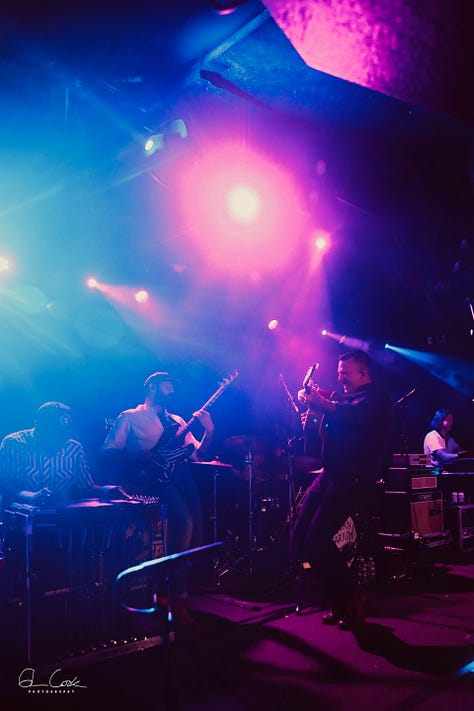
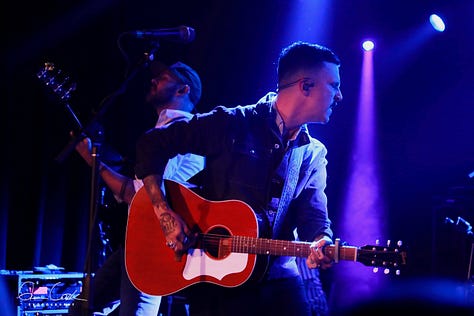
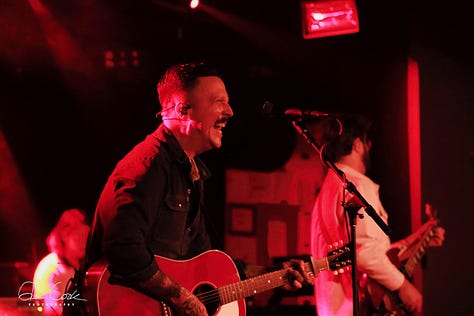
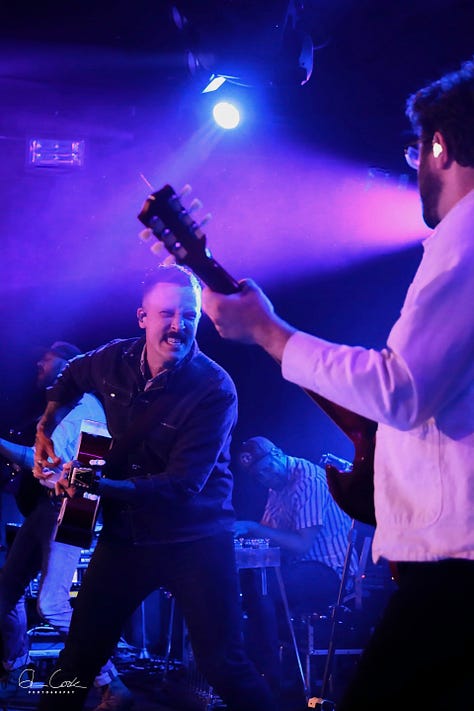
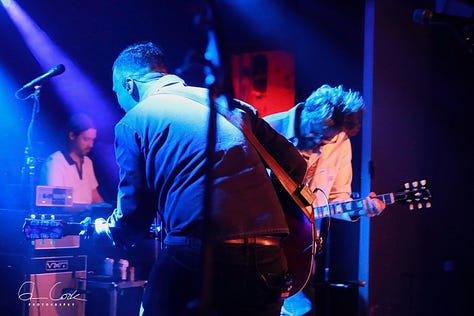
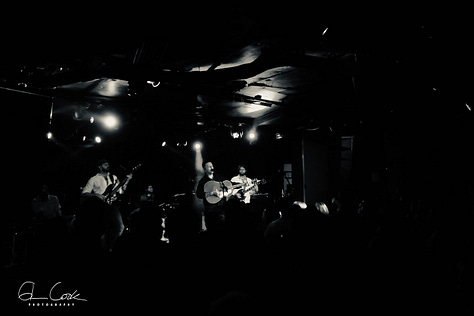
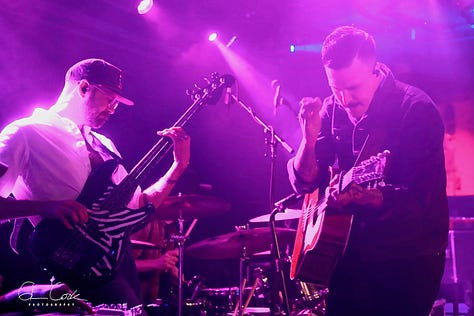
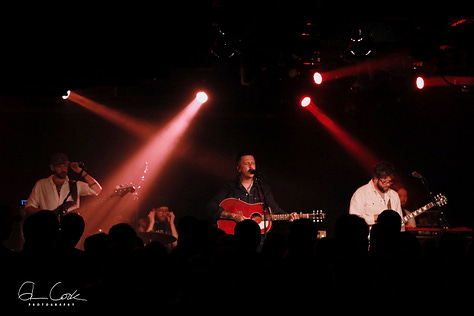
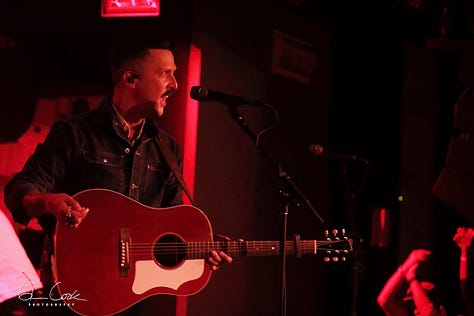
Like many people, I started listening to your band because Burn.Flicker.Die. was produced by Isbell. But that record came at a time when he was in a bad spot pre-sobriety and you weren’t in a good place either.
He was in a better spot than I was. [Laughs] That should tell you something.
You've had similar journeys, both in the music business and in getting sober. Are you still in touch?
We've been friends since before that record and we're still friends. I talked to him two days ago. We still talk regularly. We follow each other on the Internet, keep up. We usually play one or two shows together a year.
We met right after he left the Truckers. I opened up for him acoustic in either '08 or '09 when he came through Raleigh. We bonded over a love of shooting pool and traded numbers. Every time I came through the Muscle Shoals area, he'd come to see our band, and every time he came through Raleigh, we'd go see him. We just stayed in touch.
When me and the boys decided we weren't going to be a band anymore, he talked us into making Burn.Flicker.Die.. It was going be one last record of these songs that we'd been playing for a year before we quit. Instead, it was the record that changed everything. A light switch flipped, and the universe decided we had paid enough dues.
What do you think of that album today — 10 years and a lot of hard knocks later?
I think the songs were good. I also don't think it hurts that Jason Isbell produced it, even though that was a different Jason Isbell. Most people, especially in 2023, think of the internationally celebrated folk hero that is Jason Isbell. We made a record with the drunk guy that got kicked out of the Drive-By Truckers.
Those are two very different people. They look alike. They sound alike. They write great songs, both of them do. In my opinion, they're both very different people. I love both of them equally.
At this point, Barham mentioned he and Isbell had performed together in Richmond, Va., the night before Isbell went to rehab in late 2012. Footage from a private show Isbell did that night with the 400 Unit was featured in “Running with Our Eyes Closed,” the Sam Jones documentary that aired on HBO earlier this year.
That evening served as the inspiration for Isbell’s classic “Cover Me Up,” which was released on his post-rehab album Southeastern the following year. A “grainy iPhone picture” Barham took at Isbell’s wedding to Amanda Shires also is in the documentary.
What the documentary left off was they came straight to the Camel in Richmond because we were headlining a show there the same night. There's a bunch of YouTube videos of Jason getting up on stage with us, and we did a bunch of Rolling Stones and Beatles songs just shitfaced. Afterwards, we went to a tattoo parlor, and it all came to a head.
The next day, Jason texted and told me he left his jacket in our van and to please send it back to this address because he was going to rehab. Last time we opened up for him, right before he sang “Cover Me Up,” he was like, "Most people don't think this song is real." He's like, "Just ask B.J. He was there and saw it." [chuckles]
Was seeing Isbell get sober an inspiration for you to do the same?
Not only do I look up to him as a songwriter, I look up to him as a friend. I don't think it's a coincidence that two years after he got sober and got married, I got sober and got married. When you watch your friend make these life-altering changes and everything is good, it's hard not to want to make those life changes.
I attribute a lot of my career to Jason. He won't let me do it; in public he would tell you no. A lot of what we have is because of his friendship, his kindness. I'm glad he's five years older than me. I'm glad he set a really good example of how to make it in this business.
He left New West and started a record label. I left New West and started a record label. There's a lot of parallels, and it's because when you see your friends do stuff that works, you're willing to give it a try. I owe a lot of what I have in this business to, whether or not he knows it or not, the tutelage of Jason Isbell.
You got sober in August 2014, and then American Aquarium broke up 2½ years later. What happened?
Every single person in the band quit. My manager quit. It was a real hard time. There was a lot of animosity, a lot of under-the-surface broken bones that we weren't away from each other enough so they could heal.
I had a couple of weeks of panic, of having no idea what to do. Then my wife sat me down and told me, “As long as you're willing to tour and sing the songs of American Aquarium, you can move on.” She said, “As long as you're willing to keep doing this, I guarantee you can find a really good band that will want to stand on stage with you every night.” She was right. We booked a tour and numbers went up.
Starting all over again had to be scary, wasn’t it?
I think people were curious. Is it going to be as good as it was? Are we paying to see a train wreck? What people saw, instead of just six friends from Raleigh, North Carolina, traveling around playing music, was that I went out and hired professional musicians from all over the country to play these songs in the best possible way every single night.
Unfortunately, this new band got to reap the spoils of everything the old band taught me. Couple that with sobriety, couple that with self-reflection, couple that with clarity that comes with sobriety. That’s why I've had the same band the last five years. It's because I am a better boss. I am a better friend. I am a better frontman.
All the missteps I had with the old band I’ve made sure not to make with the new one. In learning from my mistakes, I'm able to keep this thing on the road and moving in the right direction.
The new version of American Aquarium recorded 2018’s Long Haul, then took it up a notch with 2020’s Lamentations, which landed the group on year-end top 10 lists despite coming out six weeks into the pandemic.
There's a roadmap in every band's career of records that change your life. Burn.Flicker.Die. changed my life. Lamentations did the same. It's neat when you put out a record that solidifies you as a real songwriter. For a long time, I was just a frontman of a pretty good bar band that had a couple of good lines, a couple of good songs.
With Lamentations, I think a lot of our fans started being like, "Holy shit, this is a folk singer fronting an arena rock band.” We found this really great mix of showing off what the band could do and also the writer I was becoming. When those things work out, it's not a coincidence.
You’ve said the pandemic was actually good for that album. Why?
If Lamentations had come out without the pandemic, I don't know if it would've reached as many people. These songs really resonated with people. They tell me, "That's my pandemic record."
People were stuck at home. Everybody was consuming everything, and they were consuming it in a way they hadn't in previous years. Normally, if you put a record out, people might listen to it on their way to work once and then come back and visit the songs they like. If you have nothing but time on your hands, like we had at beginning of the pandemic when everyone was staying home and taking it seriously, they could sit down with headphones and listen to it not once, not twice, but for a week straight. I think that's what happened.
It was a record about some negative aspects of the human experience, the letdowns, the failures. I didn't see the George Floyd thing happening a month after the record came out. I didn't see a national outcry for tearing down Civil War statues. I wrote these songs a year before the pandemic. I wish I could tell people I could see the future and foreshadow the human experience, but I had no idea what was coming.
I'm just glad people are attached to them. I'm glad people saw something in themselves in these songs.
Your latest album, Chicamacomico, deals with some extremely heavy topics. The first time I heard it, I thought the title should have been “Landmines.”
You can't help what the muse throws your way. I don't have a treasure trove of deep cuts. I write 10 songs and that becomes a record, and the next 10 songs I write are the next record. Those were the 10 songs I wrote that said something about where I was at the time.
When you look at that collection of songs, you're like, “Holy shit. This is very heavy but also a very powerful record.” I had just lost the two most important women in my life other than my wife and my daughter. Half of the most important women in my life died within two months of each other — my paternal grandmother and my mother in October and December of 2019.
You can't help but write about the heaviness of it. You're talking about death and losing people you care about. During the pandemic I lost four or five friends to Fentanyl overdoses, and that sparked another song. Then I finally came to terms and sat down and tried to write a song about a miscarriage my wife had in 2016. That came to the surface.
I tell the 20-year-old who hears this, “Man, this ain't Dances for the Lonely or Lamentations, but one day this record is going to be there when you need it." That's the first time in my career I've ever written a record and I sat back and I'm like, "This isn't going to be for everybody in 2023, but over the next 20 years, I think everyone's going to resonate with these songs at least once."
Chicamacomico was your first independent album for the band after you split with New West. Why did you decide to go that route now?
It all comes down to facilitating a livable lifestyle for me and my band. I am not willing to give people a chunk of money for my creative output when I don't think they deserve it. If I can do a job by myself and not have to pay 5%, 10%, 15%, 20% of my income to someone else, why wouldn't I do that job by myself?
In the music business, the recipe for success is easy. Everybody knows the recipe. It's just who's willing to do the work. There's plenty of great writers, great guitar players, great bands that never made it as far as we've made it because they didn't want to put in the work.
What have you learned from the experience of owning your own label? (American Aquarium’s music is distributed by Thirty Tigers.)
I'm in charge of putting out whatever I want to put out. I answer to me. Ultimately that’s what everybody wants to do. At the end of the day, you want to be your own boss.
Owning a record label taught me that if you're willing to do 100% of the work, there's a possibility for you to get 100% of the profit instead of splitting profit with people. Like every other aspect of my career, I'm always going to bet on myself. I'm always willing to bet on me. If I'm betting on my work ethic, get out of here. Nobody stands a chance.
I've put four records out now with Losing Side Records. We've got another record we start recording this fall that'll be out next year. Everything's moving forward. I'm in a really good spot. It's fun to be surrounded by a team so that now, really and truly all I have to do is focus on being a good person, a good partner, a good husband, a good dad, and a songwriter. At the end of the day, I just have to write good songs.
Conversations: B.J. Barham, Part 1
Growing up or living in a small, industrial-based town shapes you in ways you don’t realize until you leave it behind, whether it’s by fate or by choice. Some can’t wait to get out. Others choose never to leave, opting instead to remain in the “comfort of the familiar.”
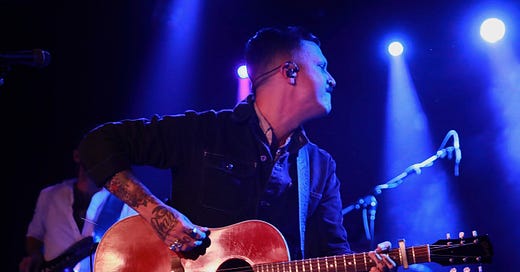






A very interesting piece, thank you. I totally understand his desire to not stay in small town Reidsville, both of my children shared the desire of not staying in Madison. Now they are in LA and Vietnam 😊
Keep writing and exploring.